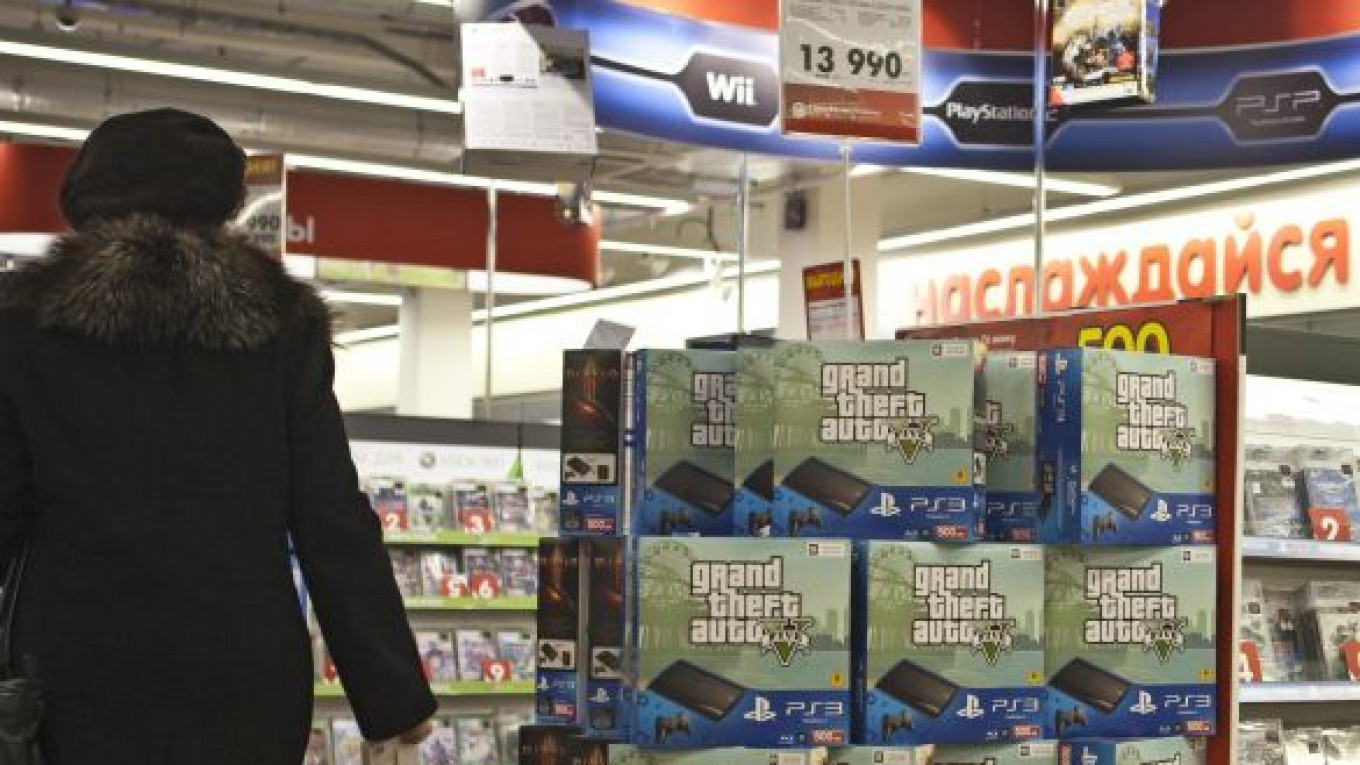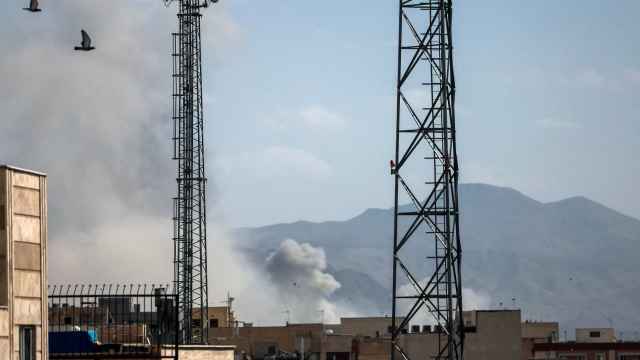"Grand Theft Auto V," which earned $1 billion worldwide in just three days, has broken seven Guinness world records, including best-selling video game.
But the action-adventure game is also making history in Russia by proving that big profits can be tapped in a country notorious for piracy — although companies admittedly are using new technology, not Russian law, to protect their intellectual property rights.
"GTA V," released by Scottish-based developer Rockstar Games on Sept. 17, has become the best-selling product of all time, more popular than any Hollywood movie or music album.
In Russia, an estimated 1 million copies worth $70 million were sold over the past month, with the game retailing for about 2,300 rubles ($72) each.
Denis Krivomazov, CEO of GamePark, which has a dozen stores in Moscow and the Moscow region, said the title's runaway success in the first three days took everyone by surprise.
"We sold the same number of copies that we had expected to sell in a month," he said. "And this was the situation in every store."
M.video, one of Russia's biggest consumer electronics chains, booked about 9,000 pre-orders and sold more than 10,000 copies in the first three days. More than 25,000 games flew off its shelves over the following month. M.video spokesman Anton Panteleyev said the number would have been even higher but the chain and its Russian rivals ran out of supplies.
It was an astounding development in the Russian video games history. Nobody could have predicted it — not least because "GTA V" is only available on the Xbox 360 and PlayStation 3 consoles.
Only 28 percent of Russian gamers use the two consoles, making the devices the least popular way to play games. About 1.2 million to 1.4 million consoles supporting "GTA V" have been sold in Russia, and 70 to 80 percent of their owners have purchased the game, according to video games data from Mail.ru Group.
"Grand Theft Auto is a cultural phenomenon that is bigger than the video game industry. It is as well known as Tetris" said Mail.ru analyst Alexander Kuzmenko.
Curiously, illegal downloads apparently caused little damage to "GTA V" sales. No pirated versions surfaced for the PlayStation 3, while illegal Xbox copies inflicted negligible damage on sales, industry players said. "Regarding the Xbox, maybe we lost 10 to 15 percent of sales, but no more," said Krivomazov of GamePark.
Piracy has been a major problem in the Russian video games industry, and consumers have long snapped up illegal discs or downloaded copies from torrent websites.
But game developers and console producers, eager to protect their investments and profits, have fought back by making it more difficult to copy games. Video games for consoles — if they can be hacked — are often two to three times more expensive to produce than computer titles.
More important, game developers have found a new way to raise money — by introducing free-to-play titles with in-game purchases and a multiplayer mode. Developers also add new levels and scenarios for multiplay that are unavailable to those who obtained the game illegally.
More than 80 percent of Russian revenues, or about $1.3 billion a year, comes from free-to-play games, according to Mail.ru.
"GTA V," while not free, offers a multiplayer mode that cannot be experienced without a licensed copy of the game.
"The majority of the most popular franchises in Russia — 'Battlefield,' 'Call of Duty,' 'Assassin's Creed,' and 'Need for Speed' — have very interesting multiplayer play, and consumers have to buy a game to play it," said Mail.ru video games analyst Alexander Kuzmenko.
Piracy is declining, not because of new laws or a social conscience but because of the evolution toward an online market.
"New anti-piracy laws are not protecting the video game industry," Internet analyst Anton Merkurov said. "In fact, people from the video games industry are not lobbying for more anti-piracy legislation. They just want to make money."
That makes the trend toward a bigger online market a major development for companies keen to tap Russia and other former Soviet republics, whose annual revenue of more than $1 billion in video and computer games top those of movie ticket sales.
Contact the author at [email protected]
A Message from The Moscow Times:
Dear readers,
We are facing unprecedented challenges. Russia's Prosecutor General's Office has designated The Moscow Times as an "undesirable" organization, criminalizing our work and putting our staff at risk of prosecution. This follows our earlier unjust labeling as a "foreign agent."
These actions are direct attempts to silence independent journalism in Russia. The authorities claim our work "discredits the decisions of the Russian leadership." We see things differently: we strive to provide accurate, unbiased reporting on Russia.
We, the journalists of The Moscow Times, refuse to be silenced. But to continue our work, we need your help.
Your support, no matter how small, makes a world of difference. If you can, please support us monthly starting from just $2. It's quick to set up, and every contribution makes a significant impact.
By supporting The Moscow Times, you're defending open, independent journalism in the face of repression. Thank you for standing with us.
Remind me later.






